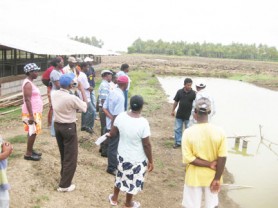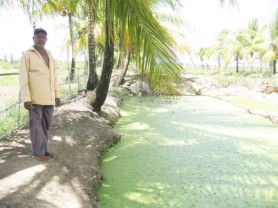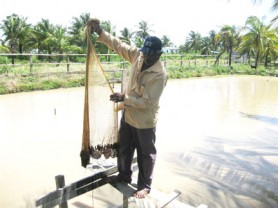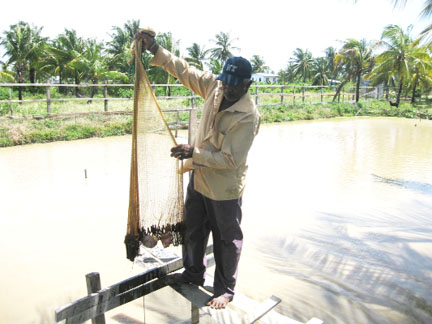Farmers of Number 30 Village and other areas were enthused to learn about an Integrated Farming System (IFS) technique that can help to improve their livelihood, reduce cost and at the same time produce biogas.

All this would be done through a bio-digester; for instance if a farmer has eight pigs or five cows he can use the manure to feed the bio-digester which would give an equivalent of two bottles of cooking gas per month.
The effluent from the bio-digester would then be used to fertilize duckweed that farmers can cultivate in a pond. The duckweed would in turn be used to feed Tilapia, chickens and pigs, resulting in 25% of the cost for ‘factory feed’ to be saved.
The farmers learnt about all this through Senior Project Extension Officer attached to the Institute of Private Enterprise Development (IPED), Walter Matadial. He was at the time conducting a training programme at the Trafalgar/ Union Community Development Committee (TUCDC).

He explained that if duckweed is properly fertilized in the pond it can have 35% to 40% of crude protein on a dry weight basis. Duckweed which is best grown in stagnant water is an effective substitute for soyabean meal and can double its weight every 48 hours.
Staff from IPED are working in collaboration with the Inter-American Development Bank (IDB) to promote the IFS. Extension Officer of the project with the IDB, Roopnarine Itwaru told this newspaper that the training was held to bring farmers up-to-date with the IFS.
After that, he said, IPED which “aims to alleviate poverty and increase wealth, would give farmers a chance to start a business,” using the bio-digester which costs about $60,000 to $70,000 to install, making their business more economically viable.

So far bio-digesters have been set up at interior locations, Linden, Parika as well and Fyrish, Corentyne. Chicken and pig farmer, Khemraj Arjune of Fyrish who recently installed the bio-digester told Stabroek News that he was pleased that he is able to produce cooking gas.
He said the TUCDC would be used as a model to farmers and that the first bio-digester in Region Five would be set up at their chicken and fish farm located aback Number 29 Village.
He pointed out that the TUCDC was used for the pilot project as it was “unique and ideal because the group is committed and willing to progress from one stage to another despite the hurdles.”
The group has six ponds consisting of three thousand red Tilapias that had been placed in the ponds in January and were expected to be exported to a market in Jamaica when they attained a weight of one pound.
Funding for the TUDCD project was provided by the European Union [EU] after the group acquired the 25-acre land in 2006.
Meanwhile this newspaper visited a chicken and aqua-culture farmer of Bush Lot, Vijainand called ‘Dillip’ who has a pond filled with duckweed.
Recently he started to feed the duckweed to the black and red Tilapias as well as hassar that he has in two large ponds and said since then his cost for feed has been significantly reduced. He was also eager to learn more about the bio-digester.
Bio-digesters
The use of bio-digesters, which convert organic wastes into a nutrient rich liquid fertilizer and biogas, is widespread in developing countries, particularly India, Nepal, China and Vietnam.
They help families by providing a cheap source of fuel, preventing environmental pollution from runoff from animal pens, and reducing diseases caused by the use of untreated manure as fertilizer.
Biogas is a sustainable substitute for the propane, kerosene, and firewood that many rural families in developing countries use for their domestic energy needs.
For families who gather firewood to use on firesides, the biogas can reduce their workload and also help prevent the deforestation prevalent in many of these areas.
In addition to providing fuel, these systems offer an environmentally friendly way of treating waste. As waste is processed in a bio-digester, it is sterilized by methane-producing bacteria and the high-methane environment.

